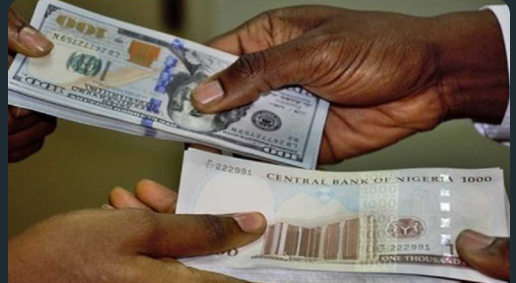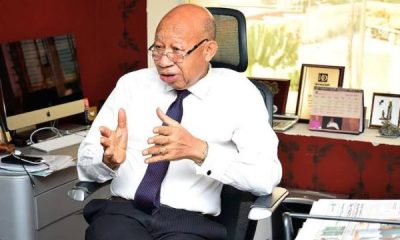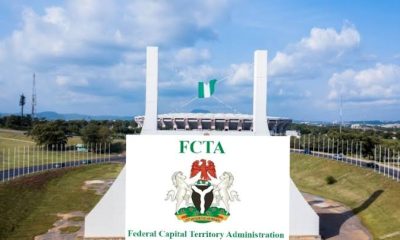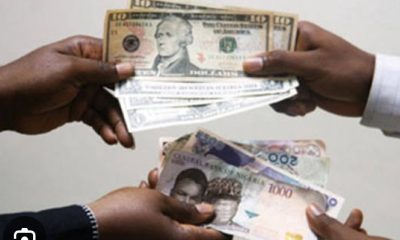Economy
My job, The Second Most Difficult on Earth – CBN Governor, Cardoso

Governor of the Central Bank of Nigeria (CBN), Olayemi Cardoso, has described his job as the second most difficult on the globe.
This is as he said the Federal Government’s reform and other actions are paying off.
Cardoso spoke Sunday in Abuja at the opening of the 2024 First Plenary Assembly of the Catholic Bishops Conference of Nigeria (CBCN).
The event was themed, “Synod on Synodality: Areas of Concern for the Church in Nigeria “
“I will continue to remember that in spite of (my job) the second most difficult job on the face of the planet, this is really something that remains very memorable,” the CBN governor said.
Cardoso, who was the Chairman of the occasion, expressed optimism that despite all the difficulties, there is light at the end of the tunnel.
“As a result of some of the recent reports from the CBN, over the course of the last week, about $1.8bn came into the markets.
“As long as the country can sustain a positive trajectory, Nigeria will get out of its economic woes and the foreign exchange market will begin to moderate itself,” he said.
He said the apex bank will soon hold the Monetary Policy Committee (MPC) meeting, where very critical decisions will be made to continue making the economy more investor-friendly.
Cardoso said an attempt to merge the official rate with the black market rate had been made, adding that the difference between the two is now significantly lower.
“There is a positive outlook on that. The positive outlook comes from the fact that a series of reforms have been made by the federal government and the Central Bank, which are now paying off in such a way that international investors are coming back in again,” he said.
He said one of the problems of economic advancement in Nigeria is finding ways to move as a country beyond being a consumer nation and shelf appetite for foreign goods.
“You have got to move as a country beyond being a consumer nation. And it is something that we as Nigerians have been talking about for so long, but really, we’ve not been able to actualize it.
“The other thing, of course, is to moderate appetite for foreign goods. And that’s closely related to what I had said earlier with respect to becoming a producer nation, because at the end of the day, many of the things you see and many of the things that bother a lot of people with respect to foreign exchange are all essentially down to demand and supply,” Cardoso said.
Economy
SEE Black Market Dollar To Naira Exchange Rate In Lagos, FCT, April 7th 2025

The local currency (abokiFx) opened at ₦1,560.00 per $1 at the parallel market, otherwise known as the black market, today, Monday, 7 April 2025, in Lagos, Nigeria, after it closed at ₦1,550.00 per $1 on Sunday, 6 April 2025.
Black market dollar to naira exchange rate today, 7 April 2025, also known as Aboki forex, can be accessed below.
NOTE: The exchange rate changes hourly. It depends on the volume of dollars available and the Demand. What this means is that…you can buy or sell 1 dollar at a certain rate and the price can change (high or low) within hours.
The official naira black market exchange rate in Nigeria today, including the Black Market rates, Bureau De Change (BDC), and CBN rates. Please note that the exchange rate is subject to hourly fluctuations influenced by the supply and demand of dollars in the market. As of now, you can purchase 1 dollar at a certain rate now however, it’s important to remember that the rate can shift (either upwards or downwards) within hours.
Economy
Crude prices slump to $65 first time since 2021

Oil prices plunged this week to $65 per barrel as the United States import tariffs and an unexpected OPEC+ supply hike erased $10 per barrel from global benchmarks.
The price appreciated last week when US President Donald Trump imposed tariffs on any country that buys crude from Venezuela.
However, oil prices turned around the corner as of Friday, with Brent falling to $65, the first time since 2021.
According to oilprice.com, the combined effect of Trump’s import tariffs, OPEC+’s inopportune decision to speed up the unwinding of production cuts, and China’s retaliatory actions wiped off $10 per barrel from global oil prices, “with ICE Brent falling below $65 per barrel for the first time since August 2021.”
The US West Texas Intermediate crude futures lost $4.96, or 7.4 per cent to end at $61.99.
“Seeing backwardation barely change compared to the beginning of the week, one could assume that US tariffs are the defining factor for the price change. Nevertheless, this week will not go down well in the history of oil markets,” oilprice.com reports.
China’s retaliatory tariffs on US goods have escalated a trade war that has led investors to price in a higher probability of recession.
China, the world’s top oil importer, announced it will impose additional tariffs of 34 per cent on all US goods from April 10.
According to Reuters, nations around the world have readied retaliation after Trump raised tariffs to their highest in more than a century.
Aside from the tariffs, another factor that further pressured oil prices was the Organisation of the Petroleum Exporting Countries and Allies’ decision to advance plans for output increases.
The group now aims to return 411,000 barrels per day to the market in May, up from the previously planned 135,000 bpd.
Economy
CBN allocates $197.71m into FX market to support naira

The Central Bank of Nigeria has injected $197.71m into the foreign exchange market on Friday, April 4, 2025, as part of its commitment to ensuring adequate liquidity and maintaining orderly market functioning.
This was disclosed in a statement on Saturday by the Director of the Financial Markets Department, Dr Omolara Omotunde-Duke, reiterating the bank’s stance on maintaining market integrity and operational transparency.
The statement read, “In line with its commitment to ensuring adequate liquidity and supporting orderly market functioning, the CBN facilitated market activity on Friday, April 4, 2025, with the provision of $197.71m through sales to authorised dealers. This measured step aligns with the bank’s broader objective of fostering a stable, transparent, and efficient foreign exchange market.”
The CBN said the intervention was in line with its broader objective of fostering a stable, transparent, and efficient foreign exchange market.
It added that it remained focused on sustaining liquidity levels to support smooth market operations amid ongoing global economic adjustments.
The apex bank said the decision to boost liquidity in the FX market came against the backdrop of significant shifts in the global macroeconomic landscape, which had affected many emerging markets and developing economies, including Nigeria.
It noted that the recent introduction of new import tariffs by the United States on goods from several economies had triggered adjustments across global markets.
It added that crude oil prices—a major revenue source for Nigeria—had dropped by over 12 per cent, settling at approximately $65.50 per barrel.
The CBN said the downturn posed challenges for oil-exporting countries, influencing exchange rate dynamics and market sentiment.
The CBN stressed that it would continue to monitor both global and domestic market conditions. It expressed confidence in the resilience of Nigeria’s foreign exchange framework, which it said was designed to adjust appropriately to changing economic fundamentals.
The bank also urged all authorised dealers to strictly adhere to the principles outlined in the Nigerian FX Market Code, promoting transparency and upholding the highest standards in their transactions with clients and market counterparties.
Meanwhile, Nigeria’s official exchange rate fell to N1,600/$1 at the end of trading on April 4, 2025, as the tariffs imposed during the Trump era continued to impact global markets.
Data from the CBN showed that the naira closed at N1,600/$1, marking a 1.9 per cent depreciation compared to the N1,569/$1 recorded the previous day.
The figure also marked the weakest level the naira had reached since December 4, 2024, when it closed at N1,608/$1. The exchange rate has now weakened by 3.9 per cent in the first four days of April, after closing March at N1,537/$1.
According to the CBN, the exchange rate closed at N1,600/$1 on Friday, marking a 1.9 per cent drop from the previous day.
The intra-day highs and lows were reported as N1,625 and N1,519 to the dollar, respectively. The intra-day high of N1,625 is also one of the highest levels recorded this year, indicating that traders priced the naira at significantly weaker levels.
Conversely, the intra-day low of N1,519/$1 suggests that some traders still priced the naira stronger, possibly betting on short-term interventions.
The NFEM rate, which represents the average exchange rate, closed at N1,567, the weakest the naira has traded this year and since December 4, 2024.
-

 News11 hours ago
News11 hours agoJust in: Founder of Diamond Bank and ex-chairman of MTN, Paschal Dozie is dead
-

 News18 hours ago
News18 hours agoRainfall washes away newly constructed multi-million naira road in Edo State
-

 News18 hours ago
News18 hours agoEvangelist Kekere Jesu buried amidst deep sorrow
-

 News1 hour ago
News1 hour agoOERAF held memorial lecture on conflict resolution, security/safety of community in Nigeria
-

 Metro18 hours ago
Metro18 hours agoStray bullet from VIP convoy kills bystander in Abuja
-

 News12 hours ago
News12 hours agoNaira Nosedives Against Dollar
-

 News7 hours ago
News7 hours agoTRADE WAR! U.S. angry over Nigeria’s import ban on 25 products
-

 Sports11 hours ago
Sports11 hours agoReal Madrid keeping tabs on Victor Osimhen





